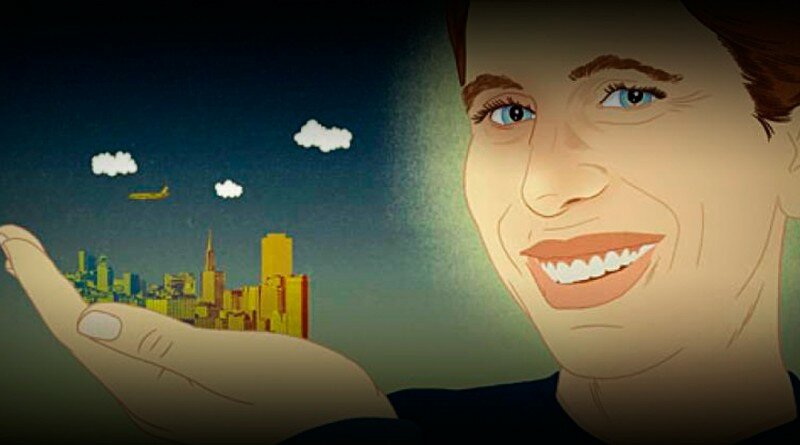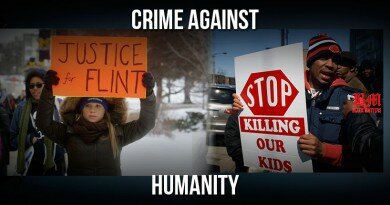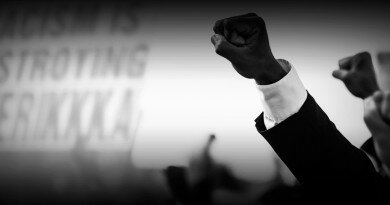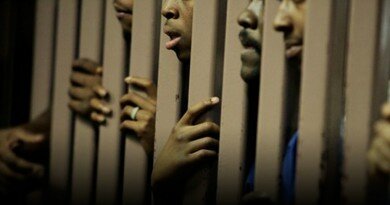blackmattersus.com
Could you please tell us a little bit about yourself?
Lisa "Tiny" Gray-Garcia
Yeah. I always start by talking about my mama, because together we dealt with homelessness for years in L.A, Oakland and San Francisco. And it was after her, my mixed race, Boricua / Irish mama dealing with racism and poverty, being literally tortured in foster homes, in orphanages because of cracker social workers and trying to come out of that, trying to understand whiteness which felt like rightness to her – which it does to a lot of colonized people of color – and why she ended up getting with my colonizer dad.
Eventually, colonizer dad left us on the street, and my mama made it by any means necessary like a lot of poor single mothers do. But in the end she was unable to keep working, she became disabled and we ended up on the street. Our homelessness lasted until I was basically an adult, until I ended up getting incarcerated for us sleeping in our car, because it’s illegal to be unhoused in the U.S. So eventually, after I was incarcerated, we started doing art, selling it on the street as vendors, like many people do all over the world, but we were unable to keep doing that, things had gotten too bad and my mum started to learn about her own culture. Together, we kind of politicized ourselves and recognized the connection between poor, single mothers and children locally and globally, and that led to the process of starting Poor Magazine, which was a very grassroots poor-people-led movement. We were homeless at the time and living in our car and I was doing straight outreach media workshops with folks for dealing with homelessness. We do it in welfare offices, shelters and on the street. Then I began to do the education on this poor people movement, and then we went from there to going further and actually creating a group that developed a concept of poverty scholarship which is a concept that those of us in struggle with disability, racism, houselessness, have our known knowledge of – which is not engaged with institutional, you can also say “crafted” knowledge. This was the creation of poverty scholarship. So coming from there, a lot of our movement was built on our revolutionary work on the streets and in the community, because we were the impactive people. We weren’t the people who were trying to incarcerate or criminalize, so it was firsthand. And when we would write in the media or go on the radio, it was always one of us on the level of our own experiences and struggles. This is who I am, and we’ve gone from there to start Homefulness, which is a poor-people-led solution to homelessness. We started the People School where we teach folks with race-class privilege about the concept of community reparations and we’re launching a series of stolen land, hoarded resources tours across the country. We’ve done a couple of them in L.A up here in the Bay Area and we’re going to be going back east and doing those later in New York.
blackmattersus.com
Could you please talk a bit more about what led to your incarceration?
Lisa "Tiny" Gray-Garcia
Well, being incarcerated is not a Hollywood movie, orange is not the new black, it’s not something we talk about because it’s cute. We talk and I write about it because it’s something that almost killed me and in that way thousands of poor people, disabled people, black and brown people are behind in the racial or plantation world now because of intentional laws in place to criminalize them. The very laws that were put in place by the people who stole this indigenous territory that the government calls America are the same sort of colonial laws in place now that are incarcerating people. I was incarcerated for 3 months because we live in a money-built state and I didn’t have the money to pay the citations that I received for the act of sleeping in my car with my mum. They have an endless amount of laws in place to make it illegal to be in public while poor. And the way that that’s raised and classed is that if you’re a person with privilege and access and you stand in public or you go to your car or to a concert, you’re not criminalized for the act of being houseless, but if you look homeless or if you act in a certain way that’s considered ‘inhuman’ or aggressive, your body, your actions and your life is going to be criminalized. That criminalization takes many forms, but it can actually end up in arrest or incarceration as it has for so many people. There’s a true line between that criminalization and the criminalization of people who don’t have documents to be on a supposed side of the border – these false borders. Black and brown young people when they stand, sit or convene together even if they’re not willing to, but specifically if they’re poor or considered low-income and from poor communities, the act of standing together is criminalized with them getting injunctions and stop-and-frisks. These are ways that poor people’s bodies or those of people of color are intentionally criminalized. So in my case, as a white-looking person, I was incarcerated because of being on the street and not having access to a roof. Families and specifically single parents living without a roof have a problem because when it’s known, you’re at risk of having your children taken away. Many seizures of children happen because a mother or a parent is homeless. So that’s how I ended up incarcerated.
blackmattersus.com
You say you are a poverty scholar. Could you explain what exactly this means to our readers?
Lisa "Tiny" Gray-Garcia
Yeah, a poverty scholar is different to an academic scholar who is given a piece of paper because they read a certain amount of books or did a certain amount of papers that ended up in a digital trash can on the professor’s laptop. Poverty scholarism means that you lived the struggle with homelessness, incarceration and many other things. It’s not something you learn by going to a class. So right now, myself and other poverty scholars teach at the same school we call People School. We teach people with race, class and formal education privilege about the concepts of poverty scholarship, indigenous scholarship, disability scholarship, but it’s not with the goal of having them become poverty scholars. It’s with the goal of having them become impacts, of having them act interdependently instead of independently, of actually causing people to move with humility instead of moving with impunity, of having people unpack their race, class and formal education privilege and of what I call community reparation. Because people are taught in this society that as long as you’re okay, then you can move on. So one of the things that we teach as poverty scholars is the concept of interdependence and how we’re all entwined while connected. Again, a lot of times what we’re teaching is for people to stop criminalizing and objectifying poor people’s bodies, to stop thinking of homeless people as a tribe. We’re not, just because we have a circumstance that makes us not have a roof. We’re outside on the streets, it doesn’t make us part of a nation. It’s not cute, it’s not fun and it’s not something that we want to do. There are some of us who are not in a position to receive help either. So there’s also the savior industrial complex and as poverty scholars, we teach people that we don’t want to be saved, we want to be supported in our own solutions. One of the things that we teach is a concept that we call Homefulness, which is a poor-people-led solution. It’s guided by principles that are taught by our ancestors, our indigenous family members, first nation folks, but it’s not taught or supported by government dollars, by poverty pimps. This is the concept of poverty scholarship – that we have our own solutions, we can figure our own stuff out, we just ask to be supported and for folks to work in solidarity with us.
blackmattersus.com
So what exactly is the message of Poor Magazine?
Lisa "Tiny" Gray-Garcia
Well, it has many messages. We are a very grassroots “non-profit organization”, we keep our 501(c) 3 “paper” because as poor peoples and indigenous peoples we must maintain paper legitimacy for settler colonizer sanctions and donations. We actually call ourselves and operate as a poor and indigenous people-led movement- a family of leaders and poor folks in resistance.
I’d say that one of the main things that we teach is to stop criminalizing the bodies of poor people, to stop privatizing their housing and services and to stop privatizing already stolen and occupied indigenous territory a.k.a public land. We’re also trying to teach that the solution to homelessness if you will, is not more grants, more foundations and more government incarceration shelters but to support and follow concepts of interdependence and community reparations and to support the solutions that poor people have for ourselves. Right now, they’re privatizing most of the land in the U.S thanks to Julian Castro who’s the next neo-liberal icon being groomed for president. He developed a concept of rental systems demonstration, a benign term which really means the privatization of public housing. What that means is that thousands more people will become homeless and on the street because poor people housing no longer exists as we knew it before. It has been dismantled and turned into mixed income privatized housing. So again, we need to recognize that these constant abuses of power and impunity and the managing of poor people and people of color’s lives is doing more harm to us than helping us, and that we need to be supporting the solutions of fellow poverty scholars like the Shack-dwellers Movement in South Africa, the Landless Peoples’ movement in Brazil, Community Land Trust in Oakland and Homefulness from Poor Magazine, these are poor and indigenous people-led movements. There are also many other movements that are actually asking to just be heard and recognized and these are also similar to movements that Black Lives Matter is putting out, and other people of color movements that are asking for self-determined solutions to problems that have been going on for years.
blackmattersus.com
You keep talking about shelter and accommodation problems of poor people in this country. Are there any other big issues that poor people face in this country?
Lisa "Tiny" Gray-Garcia
Well, criminalization is a really big one. The access to housing and services, the fact that a lot of us are still having to live off the little crumbs that they give us – welfare and food stamps – and also being shot down to nothing. We’re fighting for those all the time. So for instance, in many states now they’re asking for people to be drug tested before they can get access to food stamps. Like I said, the privatization of services so that our housing is shrinking, the little bit of government public housing that was is going away, there’s no access to child care for poor and working poor families and this is something we fight for as well. And similarly, the actual support that’s not in place for poor parents. For instance right now, there are a lot of programs in place that are there to essentially take children away from poor parents the minute that they have any kinds of problems. Instead of providing restoration and support services, there are systems in place to separate poor families. Access to healthy food – the food that poor people are able to get is extremely unhealthy and it’s rarely accessible. One of the biggest killers of poor families is food related diseases, like diabetes and heart disease which are illnesses that are caused by access to food. Substance abuse services are not there for poor folks, health care is minimal at best and is very classed and raced in its access and availability. So there are many problems and we’re constantly trying to speak on these different issues, the ways that race and poverty intersect of course, is very big in a way that sadly, oftentimes they’re not connected. The positions and the situations of poor migrant people and poor people of color and just homeless folks are oftentimes separated. Non-profits and other funding will not have to separate our issues so we look at some of these issues very holistically, that they need to be connected and that we should coalesce. And oftentimes in this society, we’re not encouraged to coalesce, we’re encouraged to separate.
blackmattersus.com
Gentrification is now a real problem in lots of cities. Is it only connected with poor people or has it got a link with people of color as well?
Lisa "Tiny" Gray-Garcia
Well, that’s a huge problem as well and to me one of the really big things that Poor Magazine works on is gentrification and displacement because these are the things that all of our members and our families have experienced. It’s almost impossible now to afford rent in most of the Bay Area, and in a lot of big cities across the U.S, people are being pushed out to the poor people suburbs. Now, when you’re low income and being kicked out of the neighborhood that you’ve lived in for generations, it’s another kind of problem because it means that you’re losing access to your network of support, to the people who helped you with childcare, elder care, the people who helped you eat and things that you’re familiar to. These are very serious problems. And then you have the issue of the abuse of poor elders. Evictions are one of the things that Poor Magazine has worked on for years. We made a connection between penal code 368 which is the Elder Abuse Law and the egregious evictions that are constantly being put on poor elders and poor elders of color as well, even elders that might happen to ‘own their property’ lose them behind the laws that are in place. So that’s another huge issue. It’s not just elders and adults but children too, so we’re making those connections between not just elder abuse but child abuse as well. Displacement from your friends, your community, that’s the kind of thing that happened to me and my family, to me and my son, when he was of school age – which he still is – we had to leave our neighborhood and that was essentially a hardship on many levels for him, he lost his friends, his community, the people that would provide child care for us, we lost all kinds of different levels of seen and unseen support networks. And then lastly, education itself. The connection with education for poor children is huge, what you get access to and what you don’t have access to, and how the public education system is being breached now completely for lower income children and children of color is related on some levels to displacement. It’s a terrifying situation. And where is that going now? I’m sure you’ve heard of the school-to-prison pipeline which is a nice hashtag but it’s very serious, because the way that schools are being breached of everything that provides actual education and specifically the way that impacts poor children is really insane. So these all sort of intersect very clearly. We try to talk about all of these because of course, our main overarching issue is poverty. So the way poverty intersects with race, disability, children, elders, families, and police terror are all very much related ultimately back to the experience of being poor in the U.S. And the ways those things then stand out from racism, ableism and classism, these are the kind of things we try to speak on from the perspective of us the impacted people.
blackmattersus.com
And would you say that we can prevent this process of gentrification or are we powerless in this situation?
Lisa "Tiny" Gray-Garcia
Oh, I definitely think that we can prevent it. What we are working on and have been working on for a while now is what we call the de-gentrification move. As long as we keep buying and selling Mother Earth, as long as people believe in the idea that you should make a profit off purchasing something that never was supposed to be purchased, then there’s nothing we can do about that arguably. I ultimately feel that it is also about moving us off the concept of property or land ownership and moving to something of land sharing and resource sharing which is exactly what we practice at Homefulness. So they’re not just utopic ideas, this is something that we’re actually doing here. And it’s hard for people to wrap their head around it because we’ve been taught for generations since the original theft of Turtle Island, when we’re talking about ‘public land’ we say, “Whose land is it?” When we talk about occupation they say, “How can you talk about occupation when nobody occupied the land?” So we’re talking about decolonization. If you’re really talking about stopping the insane and violent gentrification and displacement that comes down on specifically poor people and people of color, you have to talk about the end of property ownership. I know that we live in a capitalist system and everybody isn’t there yet. But this is one thing that’s very important to include in the conversation because if it continues at this pace you can’t continue. The other thing is that we work with the first native-woman-owned land trust in the whole nation and together we’re doing stolen land, hoarded resources tours because we’re specifically naming the buying and selling of Mother Earth as the reason and the cause of this insane rise in eviction and displacement. And how can we talk about land reclamation and land liberation? These are things that they’re doing in other countries, and that’s what we have to start doing here in the U.S. If we start doing that here and we start having that as a very serious conversation, then we might have a chance to turn back some of this violent and brutal displacement.
blackmattersus.com
So do you take part in protests against this?
Lisa "Tiny" Gray-Garcia
Yeah, we take part in protests. We always continue to fight for the amerikkklan hellfare crumbs. Most of us poor and disabled peoples wouldn’t eat or even have the meager support we do have without those crumbs.
blackmattersus.com
And what are the results you expect from them?
Lisa "Tiny" Gray-Garcia
Well, it’s a tool. So you can’t do it alone because if that’s the only thing you do then that’s all you’ll do. But it’s a tool that specifically brings about a number of familiar results. And one of them is to shame the person who you’re protesting. There’s one kind of protest that we often take part in which is eviction protests. Actually, a 99 year old African American woman was being evicted because the landlord wanted to make money on her apartment and she was in the way of it. There was no way we as conscious people were going to allow that. The only thing we could do – because we’d tried a lot of other things – was to hold a protest. The purpose of the protest actually was to shame this landlord. And it did actually work, it’s not over yet, but it was very hard. It wasn’t one protest, it was like many weeks and then a vigil and then more protesting. I mean, you think that you’d only have to do that once but no, so people are shameless and disgusting in their greed and desiring. So in the end we were finally able to beat him back from evicting her and it’s not over yet, but that’s an example of why protesting is an important thing. Right now there’s a lot of push back obviously on the police and protesting at the police stations like what a lot of revolutionaries are doing. Some of it is really effective and some of it maybe isn’t but you do different things. So at the same time as you protest, you also hit it from other sides. That to me is one of many tools, and you have to engage all of them for an effective fight.
blackmattersus.com
Do you know how authorities treat people of color in prison?
Lisa "Tiny" Gray-Garcia
Yeah. I can tell you how they treat people, they treat them like sh*t. They basically treat everybody like sh*t. The way that you survive in prison is through all kinds of survival techniques. If you’re talking of the way people of color are treated on the street, which is to be profiled and targeted, the same thing happens behind the razor wire confrontations, it’s just more heightened and worse and because there aren’t people protecting. So once you get into the depths of the system, things get worse for you. It’s all about how protected you are in the society and when you have very little protection, which is usually the position of poor people and people of color, then you’re going to be more targeted. You’re going to be in a more dangerous and vulnerable position.








